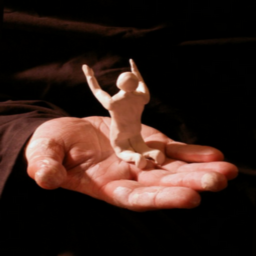Here’s a disturbing trend in the Christian blogosphere: we would much rather talk about other people than ourselves. When I post something about the church at large, the number of visitors to this site soars and comments pour in. Everyone rushes to the table where the state of the church is sliced, diced, and analyzed in detail. With the mere mention of a Christian celebrity I can purchase hundreds more visitors to my site.
If, however, I post something about our individual need to wait for God in silence, or our personal destiny to become conformed to his image, I get the internet equivalence of chirping crickets. Nothing. Like a busker singing at the Metro, everyone hurries by. And why not? Christianity is way more fun when we’re talking about other people. Following Jesus isn’t such a joyride if he wants to talk to me.
I am one of us as well. I would much rather pontificate on the issues facing Christendom across the continent than listen to the still small voice addressing the secrets of my heart. I would rather do significant things. I want to be a part of important conversations.
Recently I found the private notes of a world leader who longed to hear the whisper spoken to him alone. This man held a position of national significance, no, wait--historical importance. Yet he was a man who positioned himself in the quiet place and waited for his best friend to come and sit with him.
My heart is not proud, O LORD,
my eyes are not haughty;
I do not concern myself with great matters
or things too wonderful for me.
But I have stilled and quieted my soul;
like a weaned child with its mother,
like a weaned child is my soul within me.
O Israel, put your hope in the LORD
both now and forevermore. (~ Psalm 131, a psalm of David)
God took a boy out of the shepherd’s field and put him in the palace, but not before embedding the hillside, the breeze, the night sky and the quiet times into his heart. The Biblical histories of Samuel and Chronicles will tell you the palace was a place filled with intrigue, politics, war and power--and it was. The Psalms and Proverbs will tell you that David took time to climb the stairs, shut the door, and pick up the harp.
Our greatest need--my greatest need--is the daily presence of the Holy Spirit. When David knew he had stepped over the line, claiming power and privilege as some sort of birth right, he repented before the Lord and begged that the presence would remain:
Create in me a pure heart, O God,
and renew a steadfast spirit within me.
Do not cast me from your presence
or take your Holy Spirit from me. (Psalm 51: 10-11)
At the end of each day my Father won’t be impressed with my intellect or insight. He’ll be concerned with the beat of my heart. In the quiet (if there is quiet) he will want to know if I lived a whole-hearted life that day. Did my actions spring from the well of the Spirit or the treadmill of importance? He will be concerned with these questions because he knows that spiritual formation happens each day. The only question is: what have we formed?
 God's Heart,
God's Heart,  boldness,
boldness,  faith,
faith,  humility,
humility,  worship
worship  Monday, April 16, 2012 at 12:02AM
Monday, April 16, 2012 at 12:02AM  The Creator of the Universe is not easily impressed. Some theologians suggest that because God knows everything, he cannot be moved, but I think some things can capture God's heart. Not power or beauty or intellect--those are the things that impress fools like us. But imagine that moment when the King of the Universe sits up and takes notice of you because of something you thought, said, or did. Could you stir his heart? I think it's possible.
The Creator of the Universe is not easily impressed. Some theologians suggest that because God knows everything, he cannot be moved, but I think some things can capture God's heart. Not power or beauty or intellect--those are the things that impress fools like us. But imagine that moment when the King of the Universe sits up and takes notice of you because of something you thought, said, or did. Could you stir his heart? I think it's possible. Monday, September 5, 2011 at 08:46AM
Monday, September 5, 2011 at 08:46AM  Thursday, July 28, 2011 at 12:26AM
Thursday, July 28, 2011 at 12:26AM  Thursday, July 21, 2011 at 08:56AM
Thursday, July 21, 2011 at 08:56AM  Thursday, February 12, 2009 at 11:39PM
Thursday, February 12, 2009 at 11:39PM